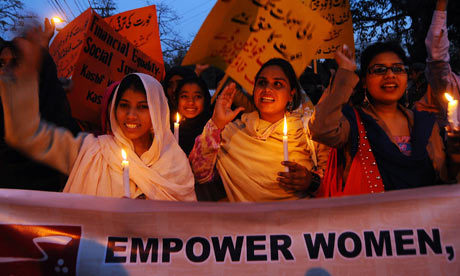BY:Sanaullah Baloch
Daily Times
In historically evolved patriarchal tradition and tribal-based social structures, women’s role has been downplayed in decision making, which naturally resulted in gender disparity and systematic discrimination against women. Exclusion of women from the peace process directly discriminates against half of the population and deprives them of engagement in constructive political change and promotion of peace and love
Despite women’s crucial participation in political movements, their role occupancy in crucial areas of decision-making, regarding war and peace, has been neglected institutionally and by their male counterparts in many countries, and particularly in Pakistan.
The ‘dirty’ war in Balochistan, conflict in FATA, and targeted killings and ethnic unrest in Karachi are massively affecting helpless mothers and sisters — where their loved ones are caught in complex conflicts. Countless fathers, husbands and sons are ‘missing’, and ‘killed and dumped’ on roadsides. However, the women’s perspective and their crucial role in peace, stability and inclusive governance are entirely ignored. Endless military operations, internal displacement, disappearances, killings and insecurity has traumatised Baloch and Pashtun mothers, sisters and wives in conflict-stricken Balochistan, FATA and Khyber Pakhtunkhwa.
In all societies where war has lasted for decades, it is very important to identify the conditions of women and realise the role of women in peace building. No doubt, men and women both suffer from war and have ideas about how to build peace. However, women’s roles, resources, needs and priorities in times of conflict are different from those of men.
In historically evolved patriarchal tradition and tribal-based social structures, women’s role has been downplayed in decision making, which naturally resulted in gender disparity and systematic discrimination against women. Exclusion of women from the peace process directly discriminates against half of the population and deprives them of engagement in constructive political change and promotion of peace and love. In many war-torn societies/countries, women contributed significantly in peace-building. A strong women’s peace movement, The Women in Black, played a momentous role in the former Yugoslavia, rejecting violence and promoting peace. In West Africa, the Women in Peace-building Network played a positive role by promoting and including a peace agenda as the main focus of its work. Included in these great initiatives by women, the Indian-Kashmiri women belonging to different religious groups (Muslim, Hindu and Sikh) initiated plausible missions on development, trauma healing and reconciliation.
Moreover, during recent times, the role of women in making and shaping peace has been widely acknowledged. A number of international commitments outline women’s right to full involvement in political and economic decision-making, including numerous resolutions of the General Assembly, the Economic and Social Council, the Convention on the Elimination of All Forms of Discrimination Against Women (CEDAW), the 1995 Beijing Platform for Action and United Nations Security Council Resolution 1325 (2000) on women, peace and security.
Implementing these commitments would be a first step toward utilising all available resources to establish and sustain peace. Nevertheless, the role of women in peace making and peace building is crucial. Women often build a foundation and catalyse the peace process. They foster reconciliation and set an example for moving society forward. Women build ties among opposing factions and increase the inclusiveness, transparency and sustainability of the peace process. Women’s gender perspective and engagement in the peace process can lead to long-term advances for women’s equality. During times of intense conflict, in many traditional societies, women’s role as a facilitator and communicator has been widely recognised to facilitate in cessation of hostilities and initiate dialogues.
In Bosnia, Rwanda, Sri Lanka, Liberia, Northern Ireland and several other places women played an encouraging role in peace-building and highlighted the importance of moving women beyond the “humanitarian front of the story”. They have and can continue to influence peace building processes so that they go beyond defining peace as the absence of violent conflict and focus on the principles of inclusion, good governance and justice.
Despite the United Nations’ forceful support to the cause of gender mainstreaming including during a peace process, the obstacles to the implementation of Resolution 1325 are enormous. Recent studies on gender and armed conflict portray a very gloomy picture. Women’s efforts to represent themselves and their concerns in official peace negotiations pose significant challenges, despite the passage of 1325 mandating women’s participation. For instance, at the Arusha peace talks to end the civil war in Burundi, only two of the 126 delegates were women. Only two women served on the 15-member National Council of Timorese Resistance in East Timor. Only five women were in leadership positions in the UN mission to Kosovo, although women had forged the way for groups to cross ethnic barriers and rebuild fractured relationships. There were no Bosnian women at the 1995 Dayton peace negotiations to end the war in the former Yugoslavia, even though this conflict had affected women in a most devastating manner. In the last few years, women have held only a small proportion of seats at the peace negotiations in Cote d’Ivore, Liberia, Somalia, Sudan, Afghanistan and Iraq.
The genuine restructuring of society based on justice, equality and lasting peace requires not only the absence of violence or war but also the elimination of unjust social and economic relations, including unequal gender relations.

No comments:
Post a Comment